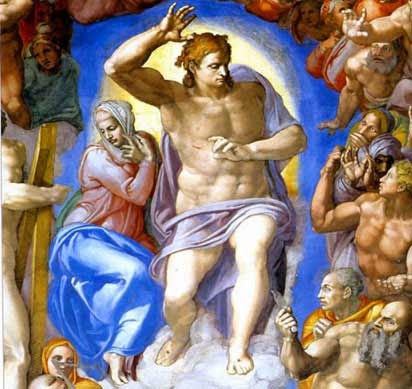Posts
Homily for the 20th Sunday in Ordinary Time, Year C
- Get link
- Other Apps

Fr. René J. Butler, M.S. Director, La Salette Shrine Enfield, NH ( Click here for today’s readings ) In today’s Gospel Jesus says he came to bring not peace but division, and he gives a short catalogue of family conflicts. If this makes you uncomfortable, you are in good company. No one likes this passage. After all, at every Mass we hear: “Lord Jesus Christ, you said to your apostles: Peace I leave you, my peace I give you.” In that context, today’s Gospel doesn’t make sense, some may even find it offensive. Where’s the reconciliation we so often read about in the New Testament? Matthew’s version of this saying is even stronger: “Brother will hand over brother to death, and the father his child; children will rise up against parents and have them put to death.” This is not about dysfunctional families, but about family crisis—caused by choice. It seems the stuff of advice columns. But it’s not just any choice. Jeremiah had enemies because he was saying what God tol
Homily for the 19th Sunday in Ordinary Time, Year C
- Get link
- Other Apps

Fr. René J. Butler, M.S. Director, La Salette Shrine Enfield, NH ( Click here for today’s readings ) I have found a new way to go crazy in four easy steps: 1. In the New Testament look up every reference to the word “Faith” (depending on the translation, about 245, not counting the word “believe”). 2. Do the same for “Hope” (about 60). 3. Find the passages in which “Faith” and “Hope” appear in the same verse (7). 4. Try to figure out the real difference between faith and hope. Today’s second reading begins, “Faith is the realization of what is hoped for,” which seems to indicate that hope comes before faith. In the first reading, faith is described in terms of knowledge based on oaths, then courage and waiting. But isn’t that hope? It gets worse. The first verse in the second goes on to say that faith is “Evidence” —“of things not seen!” Isn’t that an oxymoron? Over 450 years ago, a famous theologian wrote: “The question occurs to us; What differ
Assumption Novena
- Get link
- Other Apps

From August 7 to August 15, Priests for Life invites believers to pray the Novena in honor of the Assumption of the Blessed Virgin Mary. Lord Jesus Christ, You have conquered the power of death And opened for humanity The hope of eternal life in body and soul. You granted your Mother A share in heavenly glory, And did not allow decay to touch her body. As we prepare for the Feast of the Assumption, Grant us new confidence in the victory of life over death, And renewed reverence for the human body. As we honor Mary, Assumed into Heaven, May we proclaim the hope of Your Gospel: That you want every human life seated on your throne. May that hope strengthen us to protect every life here on earth. You live and reign forever and ever. Amen.
Homily for the 18th Sunday in Ordinary Time, Year C
- Get link
- Other Apps

Fr. René J. Butler, M.S. La Salette Missionaries of North America Hartford, Connecticut ( Click here for Sunday’s readings ) I think Ecclesiastes had a favorite song. It was the ancient Hebrew equivalent of “I’m forever blowing bubbles.” The refrain was: “Vanity of vanities, and all is vanity!” Is life worth living? Of course it is. Then what makes it worth living? All we are really told in today’s readings is what doesn’t make life worth living. It is clearly not the accumulation of things. Greed is mentioned twice in today’s readings as the opposite of what we should seek in life. Jesus suggests that there are other ways, good ways of being rich, “Rich in what matters to God.” We can intuit what that might mean. St. Paul, with another one of his lists, helps us to understand, again in a negative way, what Jesus does not mean. But earlier in the same text he writes, “Seek what is above.” And later he says we have “put on a new self.” In the Old Testament, “rich” is ofte
Homily for the 17th Sunday in Ordinary Time, Year C
- Get link
- Other Apps

Fr. René J. Butler, M.S. Director, La Salette Shrine Enfield, NH ( Click here for today’s readings ) About 30 years ago I worked at a seminary. We had a librarian named Sr. Frances. Whenever she would remind me of something I had promised to do, I would answer, “In due time.” To which she always replied with a paraphrase of Luke 16:22: “In due time the beggar died.” Most of us know the type. They ask for something. They remind us the next day. And the next, and the next... Until we do it, convenient or not, just to make it stop! Today’s story of Abraham has a brief prologue that is not included in the lectionary. “With Abraham walking with them to see them on their way, the men set out from there and looked down toward Sodom. The LORD considered: Shall I hide from Abraham what I am about to do, now that he is to become a great and mighty nation, and all the nations of the earth are to find blessing in him? So the LORD said”—and here begins our text, “The outcry again
Homily for the 16th Sunday in Ordinary Time, Year C
- Get link
- Other Apps

Fr. René J. Butler, M.S. La Salette Missionaries of North America Hartford, Connecticut ( Click here for Sunday’s readings ) In Jesus’ place, what would you have said to Martha? What would you have said to Mary? I know what I would have said: “People are like snowflakes, no two are alike.” It is one of my favorite sayings, which I often use in talks. Sometimes, when there are people in the audience who have never seen snow, I have to show pictures of snowflakes to help them see the point. Probably Martha and Mary had seen snow. It’s mentioned often enough in the Old Testament. They certainly knew it was white, and that the melting snows in the mountains were important for the spring harvests. But the idea of snowflakes not being alike? Well, it’s a nice psychological idea. But the Gospels aren’t about psychology. Still, the image helps us to see how Martha and Mary related differently to Jesus. So the psychological point has very important spiritual consequences. Have yo